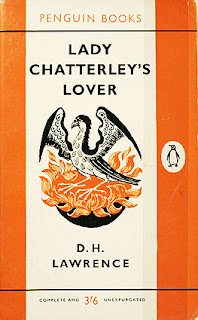Lady Chatterley's Lover
Summary (from the publisher): Lawrence's frank portrayal of an extramarital affair and the explicit sexual explorations of the central characters caused this controversial book, now considered a masterpiece, to be banned as pornography until 1960.
Review: I have always wondered about this infamous novel, but when I saw it being giggled over in the office of Sterling Cooper on season two of Mad Men, I was finally intrigued enough to read it. Of course, it was appropriate for the 1960's setting of Mad Men because this novel, originally written in 1928, was banned until 1960 and Senator Reed Smoot of Utah described it saying, "I did not believe there were such books printed in the world. They are lower than the beasts! I’d rather have a child of mine use opium than read these books." Guess it's good thing Senator Smoot isn't my father, because I quite liked this book.
Lady Chatterley's Lover tells the tale of Lady Connie Chatterley whose husband Clifford is paralyzed from the waist down (you understand the implications there), during World War I. Poor Connie is condemned as a young twenty-something bride to living a dull existence with her incapacitated and conservative husband at the seemingly backward family seat of Wragby where nothing of any real significance seems to occur. That is, until Connie starts getting it on with her husband's attractive and loving game keeper, Oliver Mellors.
I read this while simulataneously watching the 2006 French version of the film. I found it interesting that in the novel, Connie's husband tells her he wouldn't mind if she had a child with another man that they could raise together at Wragby. This conversation occurs before her affair with the game keeper. Additionally, in the novel Connie has casual extramarital affairs both before her marriage and after it, before she ever meets the game keeper. In the movie adaptation that I watched, both of those details were omitted, and I liked that choice better than the inclusion in the novel. It served to make Connie's great affair more illicit and passionate seeming, more so than in the novel where she seems to casually make the choice to sleep with men pretty frequently. And I find it hard to believe that a young lady from a respectable background would casually sleep around like Connie does in the novel given the setting in the early 20th century.
And yes, this novel is racy, even by today's standards, particularly in terms of the choice vocabulary words Lawrence employs (all the c words). However, in today's world exposed to Harlequin romance novels, the violent sexuality of the TV True Blood, and just latent sexuality everywhere on television, etc. it's certainly nothing the modern world can't take in stride.
In sum, I really enjoyed this novel. I thought it was a great portrayal of an affair. Connie and Oliver were able to escape the disappointments and disillusionment of their own lives and find hope with one another for a time. I'm not saying they were right to engage in an affair, but I see the benefits they derived from it and found myself silently urging them on and hoping they would find a way to make it work in the end. Additionally, it was an interesting portrayal of class and sex relations and post-WWI society in England. I would definitely recommend this novel.
Stars: 4



Comments
Post a Comment